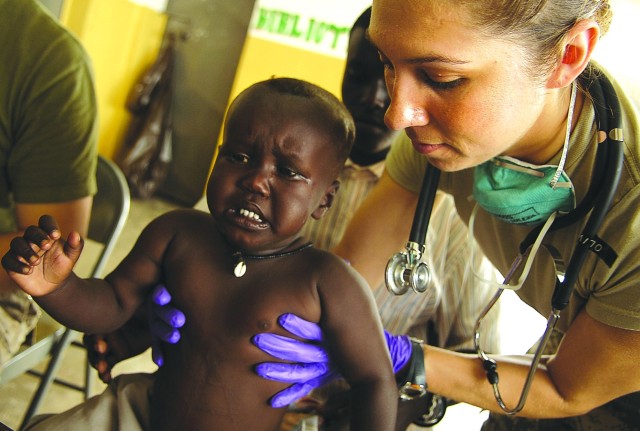
WASHINGTON (Army News Service, Oct. 17, 2008) -- As the newly formed U.S. Africa Command prepares to do business, the military must change the way it thinks about security there says a senior Army analyst.
The challenges for security in Africa affect the United States, but the way Africans view security is different than the way Americans traditionally see it, said Maj. Shannon Beebe, a senior Africa analyst under the ArmyAca,!a,,cs Deputy Chief of Staff for Intelligence, G-2.
The ArmyAca,!a,,cs effective participation in AFRICOM will require a better understanding of how Africans see security on their continent, Beebe said.
"When you start looking at the security metrics in Africa, you can't measure them the way we traditionally have,Aca,!A? Beebe said, explaining that the size and posture of their military and equipment should not be the measuring stick. "The metrics of security in Africa include secondary school enrollment, how many people are getting immunizations, the health of the population, and how many of the people are living in poverty."
Beebe said that in the United States, security usually involves state sovereignty, and the protection of territorial borders, infrastructure, technology and economic systems. To find out what security meant for those living in the nations of Africa, Beebe, a political scientist by trade, had to talk directly with the people there.
Working at the request of former Chief of Staff of the Army retired Gen. Peter J. Schoomaker, Beebe traveled to more than 14 countries in Africa to gather insight into what Africans believe is important for their security. He talked with diplomats, foreign ministers, military attachAfAs, academics, non-governmental organizations working on the continent, and even a couple of taxicab drivers.
"My job was not to tell them what security was supposed to be, but to listen," Beebe said. "Not try to make our view of security look right for them, but to understand what they say is relevant for them."
One takeaway quote from the research illustrates a clear difference between the U.S. idea of security and what is important to Africans.
"You Americans are always looking for terrorists and weapons of mass destruction," said one African diplomat. "We have those here in Africa. Our terrorism is HIV/AIDS, malaria, and poverty. We have weapons of mass destruction, too. It is an AK-47 carried by a child. And this plays itself out daily in Africa in an unforgiving environment we cannot control."
Beebe said to participate in AFRICOM, the Army will need to shift its thinking away from the state-centric and focus more on a human-based security.
"That is a tremendous paradigm shift," Beebe said. "And this falls really outside our comfort zone. Our system, our military, is designed to defend and to protectAca,!A| It is designed to protect and train against threats -- kinetic type threats. What you face in Africa are conditions, not threats, conditions that are in essence creeping vulnerabilities."
It is those "creeping vulnerabilities" that convert to traditional threats for the United States, Beebe said, threats that can be mitigated by eliminating threats to human security in Africa.
"The goal of peace and security and prosperity on the African continent translates directly to peace and security and prosperity in the United States," Beebe said. "With hard security issues, you're looking at terrorism issues, and at the youth bulges over there, that are a tremendous haven for recruitment of terrorists and trans-national criminal organizations. If you are looking at softer security questions, such as development -- an African continent that is stable and prosperous means more markets for the United States and means greater opportunities for international business and integration in the global society."
Beebe said the U.S. military in Africa, through AFRICOM, will likely work with willing nations there to help better develop their militaries, and will contribute to security in Africa. But the biggest challenge, he said, will be learning to work more closely with the non-military groups there to attack the problems causing human security issues in Africa.
"You cannot be secure and you cannot be prosperous when you are worried about health issues, when you are worried about dying of starvation, when you are worried about the poverty and when you are worried about the instabilities from rebel groups," Beebe said.
"To get that requires more than a military presence -- it requires the comparative advantages of the NGO community, private industry, and some in the academic community,Aca,!A? Beebe said. Aca,!A"That's why it's so critical to work together. That's the challenge of the 21st century, and certainly the challenge of African security and African development."

Social Sharing